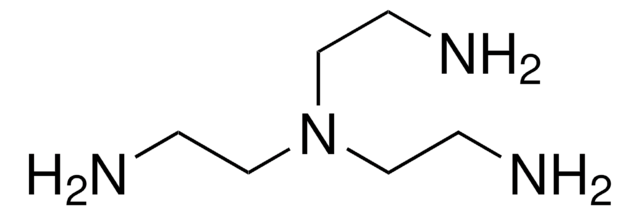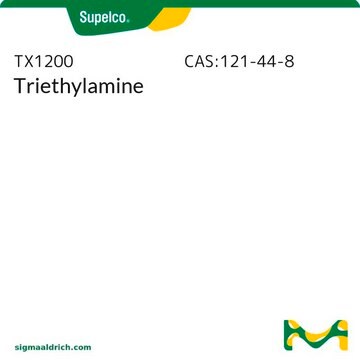T0886
Triéthylamine
≥99%
Synonyme(s) :
N,N-Diéthyléthanamine
About This Item
Produits recommandés
Densité de vapeur
3.5 (vs air)
Niveau de qualité
Pression de vapeur
51.75 mmHg ( 20 °C)
Pureté
≥99%
Température d'inflammation spontanée
593 °F
Durée de conservation
3 yr
Limite d'explosivité
8 %
Impuretés
≤0.5% water (Karl Fischer)
Indice de réfraction
n20/D 1.401 (lit.)
Point d'ébullition
88.8 °C (lit.)
Pf
−115 °C (lit.)
Densité
0.726 g/mL at 25 °C (lit.)
Groupe fonctionnel
amine
Chaîne SMILES
CCN(CC)CC
InChI
1S/C6H15N/c1-4-7(5-2)6-3/h4-6H2,1-3H3
Clé InChI
ZMANZCXQSJIPKH-UHFFFAOYSA-N
Vous recherchez des produits similaires ? Visite Guide de comparaison des produits
Application
- as a hydrogen donor for the polymerization of various monomers
- to catalyze silanization
- in the synthesis of the Cy3-Alexa647 heterodimer
- in the synthesis of methacrylated solubilized decellularized cartilage
Actions biochimiques/physiologiques
Gants suggérés pour une protection contre les projections
Souvent commandé avec ce produit
Mention d'avertissement
Danger
Mentions de danger
Classification des risques
Acute Tox. 3 Dermal - Acute Tox. 3 Inhalation - Acute Tox. 4 Oral - Eye Dam. 1 - Flam. Liq. 2 - Skin Corr. 1A - STOT SE 3
Organes cibles
Respiratory system
Code de la classe de stockage
3 - Flammable liquids
Classe de danger pour l'eau (WGK)
WGK 1
Point d'éclair (°F)
12.2 °F - closed cup
Point d'éclair (°C)
-11 °C - closed cup
Équipement de protection individuelle
Faceshields, Gloves, Goggles, type ABEK (EN14387) respirator filter
Faites votre choix parmi les versions les plus récentes :
Déjà en possession de ce produit ?
Retrouvez la documentation relative aux produits que vous avez récemment achetés dans la Bibliothèque de documents.
Les clients ont également consulté
Articles
Amide bonds are ubiquitous in both nature and industrial applications. They are vital to the structure and function of biological macromolecules and polymers. The importance of this functionality has resulted in numerous approaches to its formation, ranging from stoichiometric activation of carboxylic acids to more recent advances in catalytic amide bond formation.
The Heck reaction is the palladium catalyzed cross-coupling reaction between alkenes and aryl or vinyl halides (or triflates) to afford substituted alkenes.
Notre équipe de scientifiques dispose d'une expérience dans tous les secteurs de la recherche, notamment en sciences de la vie, science des matériaux, synthèse chimique, chromatographie, analyse et dans de nombreux autres domaines..
Contacter notre Service technique











